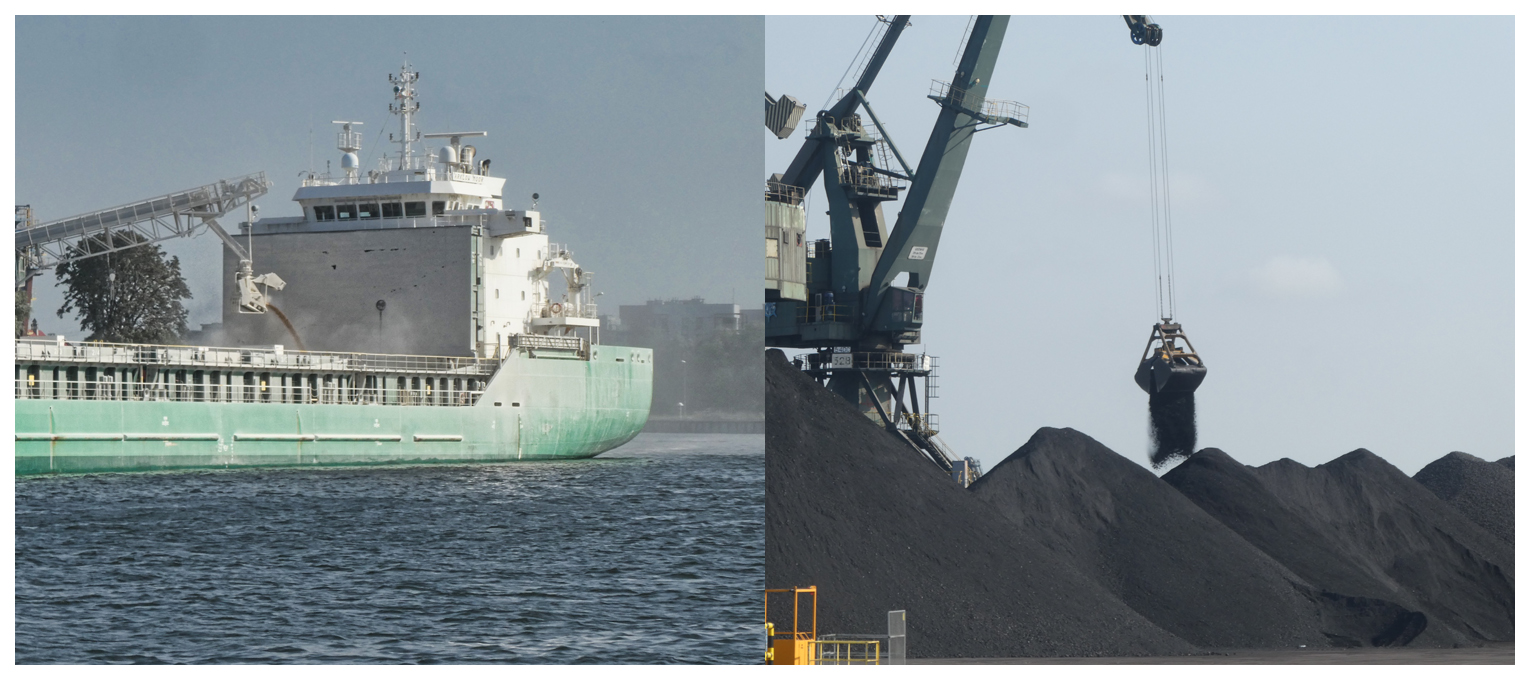
A year ago, before COP26, I reflected upon the bald statement made in LIFE, the popular mainstream magazine, way back in 1953: ‘Man himself … may be the cause of our warming climate’. Now, after COP27, with some anaemic progress chalked up, what personal experiences resonate with global events and deliberations? Well, during a summer visit to NE Poland, on a riverboat trip in Gdansk, we witnessed bulk carriers loading grain and unloading coal…
It’s a fair assumption that the three bulk carriers unloading coal were there to plug the energy gap provoked by Putin’s invasion of Ukraine. This major and historic entrepôt might also have been handling the export of Ukrainian grain – which during our visit went on through the night; dust from the pouring grain made for an atmospheric picture from the medieval city centre.

Whether true or false in this case, the twin images tell a story of how events can derail good intentions. Even better, they work as a satisfyingly equinoctial metaphor for good and bad news: Light-grain and Dark-coal, Life-food and Death-carbon. It’s easy – and accurate – to read the image of black coal as indeed sinister.
The bad news is easy to find. Here is Prof Dieter Helm’s summary of COP27 :
Greta Thunberg was right. COP27 was not serious about climate change, and after 26 previous COPs, this latest one will not make much difference to the march of the carbon concentration in the atmosphere – indeed it could even make it worse. Why? Because it gives the illusion of progress, stifling the urgency of other approaches, and because it has now moved on from the focus on emissions to the issues of compensation. COP27 has been all about who should pay for the past and, like slavery, while the case for compensation is strong, it does nothing to deal with the causes of today’s emissions, just like the debate about reparations for slavery does little to deal with modern slavery.¹
Even more dispiriting is the continued presence of climate denial, delusion and false reasoning – all still active, all still too close to the seats of power, and still often going unchallenged in the media. This weakens resolve and dissipates energy everywhere. At the opening ceremony of last year’s COP26, Prince Charles said that the world needed a ‘war-like footing’ to tackle the ‘existential threat’ of climate change and biodiversity loss. The future King was surely right.
This morning I came across an ideology new to me: ‘longtermism’, aka Effective Altruism (EA), which, bizarrely, deprioritises the climate crisis, as being less critical for the (very) long-term future of humanity here on Earth and far beyond. Its main philosopher-proponent is William MacAskill, who insouciantly suggests that fifteen degrees of warming “would not pass lethal limits for crops in most regions”. The Bulletin of the Atomic Scientists has critiqued² the very dubious climate science in this heads-far-above-the-clouds stuff. And I thought the problem was largely from the backward-looking with their heads in the sand…
 So how about the good news? How can seekers of positive solutions survive amidst such doomy gloom? How can EQ’s message that we can all do our bit be disseminated? We have to keep hope alive, and EQ has firmly fixed its colours to the mast of positivity with its new logo: still Earth-centred (more so, with the planet’s axial tilt incorporated), still maths-derived (rational, neutral) – and now undeniably cheerful!
So how about the good news? How can seekers of positive solutions survive amidst such doomy gloom? How can EQ’s message that we can all do our bit be disseminated? We have to keep hope alive, and EQ has firmly fixed its colours to the mast of positivity with its new logo: still Earth-centred (more so, with the planet’s axial tilt incorporated), still maths-derived (rational, neutral) – and now undeniably cheerful!
This blog was suspended until I’d attended the Royal Geographical Society’s Lecture: 39 Ways to Save the Planet given by the presenters of the BBC Radio 4 series, Tom Heap and Dr Tamsin Edwards. I wrote then ‘I have a feeling some inspiration will come…’
Well, of course it did – not just from the energy of the presenters at the twin lecterns as they presented a small selection from the 39 Ways, and the podcasts’ (and book’s) message of practical, real world solutions to climate change, but also because the intervening week has been good for positive news.
First, there were the Earthshot Prize Awards – equally focussed on positive solutions to the climate/biosphere crisis. Then government policy towards onshore wind investment was relaxed – a sign of internal arguments being won³. Thirdly Also today COP15, the decennial conference on biodiversity loss, began in Montreal. Less trumpeted than COP27, perhaps this may achieve more for being conducted beyond the limelight’s glare.
So I resolve to be less seduced into depression by the bad news, and conclude with an observation, interestingly not available to the sceptic, the myopic or the denier:
Now that climate change is known to be man-made, it follows that the recent rapid rise in global CO2 – geologically unprecedented – can be turned back down to become a tiny temporal ‘blip’ in the story of Earth.
If we made global warming, we can unmake it. Just. If we cooperate.
Paul Taylor says:
I am amazed that Life magazine referred to man’s influence on climate as early as 1953. I am also amazed and mystified by William MacAskill’s 15degrees comment. People need to grasp the urgency of the situation and the geopolitical implications of failing to do enough to address the existential threat that global heating presents. Mass migration, war and extinction of species are just some of the inevitable consequences of inadequate responses to the climate threat.